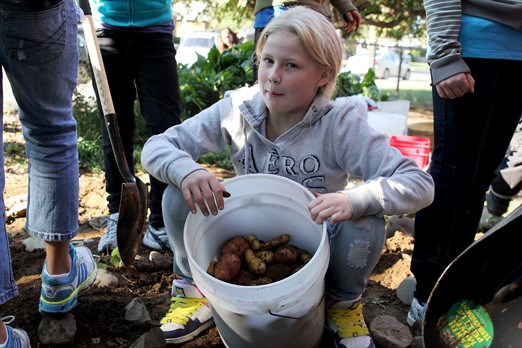Aidan Johnston didn’t mind giving up his recess for gardening.
A Grade 7 student at Agnew H. Johnston public school, last spring Aidan and his classmates continued a tradition at the school, planting a vegetable garden before leaving for summer vacation. On Monday they helped harvest the result, digging out potatoes, chopping down Swiss char and collecting a variety of fresh herbs for a special soup they plan to share with the school at the end of the week.
“It’s a big opportunity for us, so we can interact and learn all this stuff for when we get older,” he said.
Aidan said being involved from start to finish will make it that much sweeter an experience.
“It will probably feel much better than eating ordinary soup, because you put in all this effort into the garden and you get an amazing soup that comes out,” Aidan said.
Zoe Hynnes was also involved in the project, and said it taught she and her fellow students a lot about an area of life she knew little about.
Students planned the garden well in advance, picking out just what to plant, where each vegetable should go and then tending them once they’d sprouted.
“Each week we’d come out and water plants during our first recess. We’d pick up garbage and we would weed it. And after awhile we got to harvest it,” she said, her hands still caked in soil, having spent the morning on a treasure hunt for buried potatoes.
Coming back to a full-fledged garden was especially cool, Zoe said.
“You saw how your work paid off.”
Harvesting the potatoes was the best part, she added.
“It was like a scavenger hunt, it was like finding buried treasure,” Zoe said. “I didn’t think we were going to find that many. We have buckets full.”
Jennifer Lailey is a parent-volunteer who oversaw the project.
She said it’s important to reconnect today’s generation to the land and the food it produces.
“It’s nice to expose children to an alternative, more local, more hands-on, more agricultural sense of where their food comes from,” Lailey said.
No longer in an agricultural-based society, many children have no true inkling of where their food comes from, she added.
“Food is just something that’s always going to be there. We take it for granted that it’s always going to be there. We just buy it at the grocery store. I think in our remote past, somewhere in our minds, we know what farms are for,” Lailey said.
“And just being exposed to grandparents and cooking with them we know there’s a link to that awareness, but you just see it eroding quickly.”
It’s even more nourishing than the actual food itself, she added.
“It’s more nourishing for who they understand themselves to be. It nourishes a healthier sense of self in a way.”
